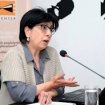Russia and the Karabakh Conflict – 2018: Page 2 of 6
viewed in different coordinates and dimensions in different years. If the main criterion for Russia was the foreign policy vector in the development of Armenia and Azerbaijan (and keeping the countries within its influence orbit), for Armenia and Azerbaijan the degree of Russia's loyalty to the Armenian and, respectively, Azerbaijani positions in the struggle for Karabakh remained unchanged. However, unlike Azerbaijan, this formula was not always of absolute priority in the relations of Armenia with other countries. Take for example the case with the Armenian-Turkish protocols. Or Armenia’s policy in relation to other countries that show unconcealed sympathy for Azerbaijan.
Stepan Grigoryan – I think that Russia's top priority in the post-Soviet space is to prevent the integration of post-Soviet countries into other political, military-strategic and economic systems. Therefore, in the context of Armenia and Azerbaijan, Russia would not want their rapprochement, for example, with the EU. The unresolved nature of the Karabakh conflict is a good tool for achieving this goal. There is another aspect in Russia's policy in the South Caucasus. As you know, Russia sells weapons to Armenia and Azerbaijan. On the other hand, Russia is the key co-chair of the OSCE Minsk Group, and logic suggests that it should not have participated in the militarization of the region. I am not yet referring to the fact that Armenia together with Russia are members of the CSTO, a system of collective security. It might seem that this factor should have played a deterrent role in the sale of weapons to Azerbaijan. However, we see a rather complex policy pursued by Russia in the region, and it is clearly difficult to qualify it.
Vadim Mukhanov – It is obvious that Moscow is interested in a stable and predictable development of the situation throughout the Caucasus region, but a number of internal and external factors have an impact on this. The situation in the region and beyond is changing rapidly, which affects priorities and the sequence thereof. Unquestionably, Moscow's relations with Yerevan and Baku have and will have a direct impact on the situation in the conflict zone. However, the main actors in the settlement are the parties to the conflict, and a key marker in the evaluation is the evident interest of the parties in any compromise. The reference to Moscow is traditional and understandable, but it no longer plays such a role as, for example, it did in the 90s.
Alexander Podrabinek - The key to the solution of the Karabakh issue is, first of all, in the democratization of Armenia and Azerbaijan, as well as in getting rid of dependence on Russia. The decades-long attempts to resolve the problem through negotiations are completely fruitless and hopeless. This is similar to treating a serious illness with spells. Today, there is a hope that Armenia will show an example of effective development and possible solution of the Karabakh issue. That is why we should expect the Kremlin to try to stop Pashinyan. I think Moscow is looking for ways to do this. The Putin administration is unlikely to accept the







 +37410 563363
+37410 563363
 1/3 Buzand Str, 8 Floor, Yerevan, Armenia
1/3 Buzand Str, 8 Floor, Yerevan, Armenia